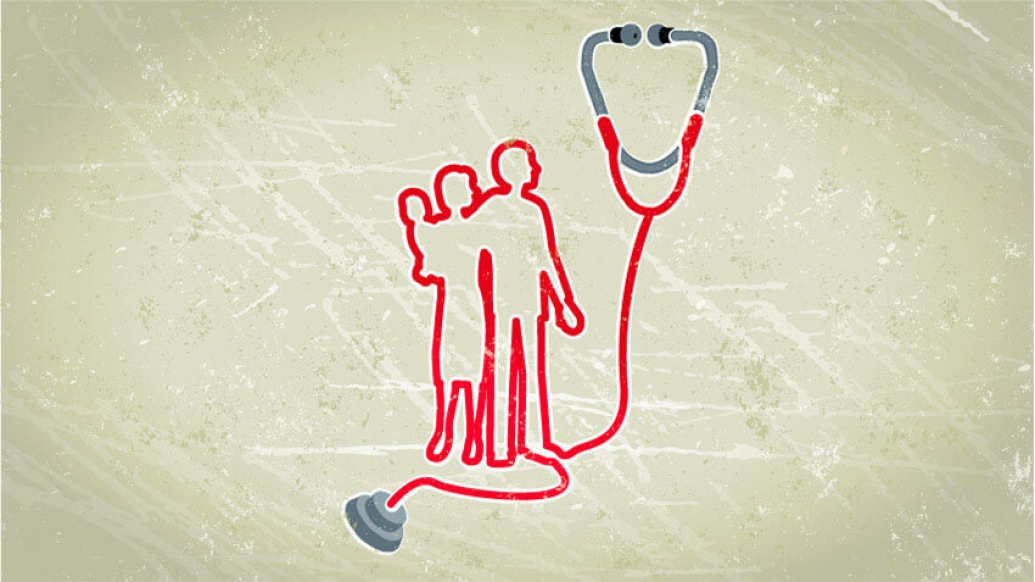Major differences found between male and female physician-parents in disruption to childcare, work and new depression symptoms.
11:00 AM
Author |

A new study shows just how much of a toll the pandemic has taken on physicians who have children at home – especially those who are mothers.
Not only did it disrupt the home and work lives of female physician-parents more often, but long-term data on their mental health shows a sizable gender gap erupted in their risk of depression and anxiety compared to their male counterparts.
The study, published in JAMA Network Open, uses data taken from a long-term study of early-career physicians, including information on their pre-pandemic mental health.
The study team is led by University of Michigan researchers who first enrolled the physicians more than a decade ago, when they were in their first year of post-medical school training and took part in the Intern Health Study. The follow-up study surveyed them in 2018 and 2020. The study focuses on 215 physician-parents of children under age 18 who completed the survey in August 2020, including 180 who were already parents in 2018 and also took a survey then, too.
SEE ALSO: Parenting Conflicts May Stall Career Growth for Physician Moms
Pandemic study data shows distinct disparity between women and men doctors, with physician-mothers being:
-
Much more likely than physician-fathers to lose childcare or in-person school for their children (84% vs. 66%).
-
Far more likely to have primary responsibility for childcare or schooling (25% vs. 1%).
-
More likely to perform the majority of day-to-day household tasks (31% vs. 7%).
-
Nearly twice as likely to mainly work from home during the pandemic's early months (41% vs. 22%) – with an even greater difference in couples where both are physicians working full-time (65% vs. 25%).
-
More than twice as likely to have voluntarily reduced their work hours during the pandemic (19% vs 9%), even though physician-mothers were already less likely to work full-time than physician-fathers before the pandemic (73% vs. 91%). In couples where both were physicians working full-time before the pandemic, 26% of the women reduced their hours vs. 3% of the men.
-
Far more likely to report conflict between their work and their family life than men, which was found by using a standard questionnaire and adjusting for multiple factors including child age, medical specialty and partner employment status.
Mental health differences in female physicians vs. male physicians
Comparing the physicians' mental health scores, the researchers show physician-mothers scored significantly higher than physician-fathers for depression and anxiety symptoms in August 2020.
For both genders, less sleep was associated with higher scores on both mental health measures.
Focusing on the 180 physicians in the study who had already become parents by the time they took the pre-pandemic survey in 2018, the researchers found a striking effect.
With the increased burden placed on physician-mothers during the pandemic, these findings show the need for immediate action to ensure that they have access to adequate support at work and at home.Elena Frank, Ph.D.
Where physician-mothers and physician-fathers had scored about the same on depression levels pre-pandemic, by August 2020 the women scored significantly higher than men on the depression scale.
The researchers also compared physician-parents with physicians who were not parents in 2018 or 2020. The non-parents had no gender gap in depression or anxiety scores on either survey.
Elena Frank, Ph.D., the Intern Health Study's director and an assistant research scientist at the Michigan Neuroscience Institute, notes that the study is the first to provide evidence that pandemic conditions have contributed to gender disparities in work-family conflict and mental health status among physician-parents.
The study also confirms anecdotal reports that the emotional toll and career costs of the pandemic are greater for mothers than fathers.
"With the increased burden placed on physician-mothers during the pandemic, these findings show the need for immediate action to ensure that they have access to adequate support at work and at home," said Frank, the study's first author. "Establishing institutional and public policy solutions to mitigate the long-term effects on the well-being and careers of physician-mothers will also be critical, including a viable path for re-integration into medicine as we move out of the pandemic."
MORE FROM THE LAB: Subscribe to our weekly newsletter
"Mothers across professions have been torn between their careers and their home lives during the pandemic," said Srijan Sen, M.D., Ph.D. "We were fortunate that we had followed these physicians from before the pandemic allowing us to understand how their lives changed. Mothers in other professions likely had similar experiences."
Sen is the principal investigator of the Intern Health Study, director of the U-M Frances and Kenneth Eisenberg and Family Depression Center, and a professor in MNI and the Department of Psychiatry.
SEE ALSO: Are Women Physicians Fairly Represented in the COVID-19 News Cycle?
The Intern Health Study, which is also studying the impact of the pandemic on physicians who were in training at many U.S. and Chinese teaching hospitals during 2020 and 2021, began in the early 2000s.
Because first-year residents, called interns, all go through a similarly stressful and intense experience, the study uses them as a population that gives insights into the roles of sleep, stress and genetics on mental health. It is funded by the National Institute of Mental Health (MH101459).
In addition to Frank and Sen, the study's authors are Zhuo Zhao, M.S., and Yu Fang, M.S.E. of U-M, Lisa Rotenstein, M.D., M.B.A. of Harvard Medical School, and senior author Constance Guille, M.D., co-investigator of the Intern Health Study and an associate professor of psychiatry at the Medical University of South Carolina.
Paper cited: "Experiences by Gender of Work-Family Conflict and Mental Health Symptoms Among Physician Parents During the COVID-19 Pandemic," JAMA Network Open, DOI:10.1001/jamanetworkopen.2021.34315
Like Podcasts? Add the Michigan Medicine News Break on iTunes, Google Podcasts or anywhere you listen to podcasts.

Explore a variety of healthcare news & stories by visiting the Health Lab home page for more articles.

Department of Communication at Michigan Medicine
Want top health & research news weekly? Sign up for Health Lab’s newsletters today!





